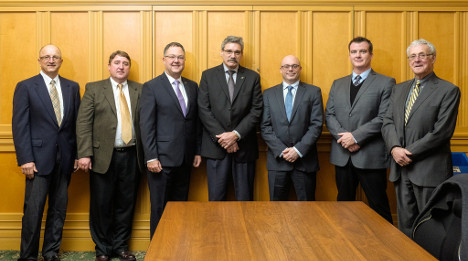To get a pulse on the 2017 regulatory environment, Auto Remarketing Canada reached out to leaders at the Ontario Motor Vehicle Authority (OMVIC) and the Alberta Motor Vehicle Industry Council (AMVIC).
When asked what was top of mind for the regulatory bodies in 2016, Brian Osler, director of legal services for OMVIC, said what is particularly striking is the pace of change in the industry.
“Keeping stride with emerging business models is important for all stakeholders,” he said.
One of the ways OMVIC is navigating this quickly-changing landscape is through the hire of its new chief executive officer John Carmichael, who was a Member of Parliament and also headed up a successful family-based dealership.
“He has a solid understanding of how new business models can impact upon regulatory concerns. He’s a good guy to have around with navigation of these issues top of mind for us,” Osler shared.
Doug Lagore, interim CEO for AMVIC, said “multifaceted stakeholder engagement” has been at the top of the to-do list this year for his agency.
“We have initiated stakeholder engagement sessions focused on advertising regulations. This is also a great forum for hearing directly from dealers, licensed salespersons and marketing and advertising people regarding challenges or concerns they may face in meeting the regulations,” he explained.
Consumer engagement is also critical, so AMVIC has been participating at trade shows and making connections with municipal decision makers at local government conferences, as well as employing consumer-focused bulletins and social media accounts to get their message out.
Tackling All-In Price Advertising
OMVIC continues to battle for all-in price advertising compliance. In Ontario, it is illegal for dealers to add on costs to a vehicle price later in the purchase process that are not initially advertised and disclosed to consumers. The regulatory body has recently expanded its consumer awareness campaign to inform car buyers of their right to all-in price advertising. Osler shared that compliance is still an issue.
“We are utilizing TV, radio, out of home (billboards/transit), online and social media to deliver the message,” Osler said.
Consumer awareness of all-in price advertising rose from 27 percent to 33 percent last year during an OMVIC campaign to address the issue. This number came in at just 19.7 percent in 2014, and OMVIC’s target for 2017 is to further increase that awareness to 38 percent.
Unfortunately, non-compliance remains a significant concern.
The most recent discipline decision involving all-in pricing was issued on July 24 of this year.
In that case, the dealer advertised a selling price for three vehicles. When the dealer sold the vehicles, they added additional charges. The dealer refunded the additional charges to the purchasers and arranged for all staff to attend the OMVIC advertising seminar. The dealer was also fined $4,500.
Osler said recent mystery shops of new-car dealers in Ottawa found 15 out of 20 dealers tried to charge fees in excess of their advertised prices, while current mystery shopping being conducted in the Greater Toronto area shows preliminary findings of 45 percent non-compliance.
“This must change. It is unfair when dealers cheat the system. It is important to have a level playing field for dealers who follow the law,” Osler said.
Consumer education protection as a priority
Last year, AMVIC updated its laws regarding consumer education protection requirements. Now, any salesperson out of the business for over three years has to successfully retake the salesperson Fair Trading course to get their license.
“As Alberta’s automotive regulator, our role is to provide consumer protection and promote both consumer and industry education,” Lagore said.
AMVIC also engaged with consumers at the 37th annual Edmonton RV Expo & Sale in February, and chatted with municipal leaders at the 2017 Alberta Associate of Municipal Districts and Counties trade show in the spring regarding the topic of consumer education protection.
AMVIC also issues consumer and industry bulletins throughout each month and makes “connecting with all of the stakeholders — consumers, industry and government — a priority in its role as an automotive regulator,” according to Lagore.
AMVIC responds to 2016 report recommendations
In other news from AMVIC, the agency has recently hired for the positions of registrar, human resources manager and legal counsel, directly acting on recommendations outlined in the “2016 Report on Governance and Operations” commissioned by Service Alberta. It has also recently increased the number of Peace Officers that investigate files across Alberta from 13 to 16 officers.
Brenda Chomey has joined AMVIC in the newly created position of registrar.
“Ms. Chomey has extensive qualifications and experience pertaining to the role, including conducting hearings, hearing evidence, making decisions and writing the supporting decision papers,” Lagore said.
Deb McKay has joined AMVIC in the newly created human resources manager role. McCay has more than 20 years of experience in human resources in varied environments.
Jacqueline Kibsey, who has previous experience as in-house legal counsel and extensive training in civil litigation, has been recently named as AMVIC’s in-house counsel.
Kibsey will be concentrating on providing legal and strategic advice to AMVIC to ensure consistent interpretation and application of legislation, regulation and policies. Additional areas of focus will be on legislative and policy review and reform, alternate dispute resolution and continuation of building and maintaining strong, positive relationships with AMVIC’s stakeholders.
As for additional ways AMVIC is following the report’s recommendations, Lagore said, “We have just concluded our most recent ad campaign, which included ads on Global news traffic reports in Edmonton and Calgary, as well as online ads.
“We emphasized turning to AMVIC as a resource throughout the vehicle purchasing process, and we are planning a fall 2017 campaign,” he added.
AMVIC is also currently planning four more stakeholder engagement sessions, where it will provide information on automotive advertising requirements, and engage with members to listen to their concerns in meeting the regulatory requirements.
It is also actively increasing communication efforts to the public and the industry to create awareness and understanding of its role, especially in smaller Alberta markets.
Keeping dealers engaged and up-to-date
For any regulatory body these days, keeping their constituents up-to-date on compliance and new campaigns and focuses is increasingly important.
OMVIC uses social media, bulletins, dealer standard newsletters, seminars and webinars to keep its dealers up to date and engaged.
“We are currently developing a plan to introduce educational materials via video and infographics,” Osler added.
At AMVIC, Lagore shared even if laws and regulations have not changed recently, it’s important to continue to work hard to ensure new businesses and new salespeople are aware of the legislation that applies to them.
“This includes the Fair Trading Act, the Automotive Business Regulation, the Cost of Credit Disclosure Regulation, the Internet Sales Contract Regulation, the Vehicle Inspection Regulation (of the Traffic Safety Act), as well as the sections of the Criminal Code relating to forgery, fraud and false pretenses,” Lagore concluded.
AMVIC engages with industry engagement in several ways, from its quarterly periodical, IMPACT, to industry bulletins and its Stakeholder Engagement Sessions.
The Ontario Motor Vehicle Industry Council has a new chief executive officer. The regulator said Monday that John Carmichael will take on the CEO role starting Wednesday.
“We wanted to ensure we found exactly the right person, with the necessary experience and skill set, to lead OMVIC and to ensure its ability to meet its mandate is not only maintained, but strengthened,” OMVIC board president Ron Marostica said in a news release.
Carmichael was a Member of Parliament from 2011 to 2015, representing Don Valley West. This followed his time running a General Motors dealership in the Greater Toronto area.
“OMVIC has earned a remarkable reputation with the government, with consumers and dealers, and with other regulators and law enforcement agencies,” Carmichael said in the release. “As a member of OMVIC’s founding board, I am very proud of the reputation for excellence this organization has earned, in no small part due to its commitment to stakeholder engagement, and I am excited to continue this incredible work.”
Some consumers are being overcharged when they buy a vehicle, according to the Ontario Motor Vehicle Industry Council.
“Since 2010, all-in price advertising has been the law in this province,” explained Terry O’Keefe, director of communications and education for OMVIC. “Unfortunately, our research shows that a small minority of car dealers continue to add hidden fees or extra costs that exceed their advertised prices.”
For that reason, the regulator this week launched a 10-week consumer awareness campaign to help further educate Ontario car buyers about their right to all-in price advertising.
Details of the campaign
Picture a dog relishing a car ride — tongue lapping the air and fur flying in the wind. It’s a sight that exemplifies simple joy, right? And it happens also to be the imagery supporting OMVIC’s message: all-in price advertising. O’Keefe explained that it’s putting the fun and excitement back into buying a vehicle — not to mention, it’s the law.
OMVIC indicated the province-wide campaign utilizes TV, radio, online and social media advertising.
“While the message delivery is lighthearted, it’s hoped the outcome will have an important affect,” O’Keefe said. “That being, consumers will avoid dealers who break the law and instead buy vehicles from those dealers who provide the fair and transparent advertising required by Ontario’s consumer protection legislation.”
To access OMVIC’s TV or radio commercials, go here.
Understanding all-in price advertising
OMVIC reiterated all-in price advertising is the law in Ontario. If an OMVIC-registered dealer advertises a price for a vehicle (new or used), that price must include all fees and charges the dealer intends to collect. The only additional fees a dealer can charge are HST and licensing, which refers to the actual cost of vehicle registration and plates and it cannot include extra fees added by the dealer.
An advertisement is any inducement to buy or lease a vehicle. This would include — but is not limited to — ads:
—In print (newspapers, magazines, etc.)
—On the Internet (dealer site, online marketplace, etc.)
—On social media
—On radio or TV
—On signs (including those in or on a vehicle)
—What must be included in an all-in price advertisement?
Examples of fees or charges that must be included in an advertised price include:
—Freight
—PDI-PDE (pre-delivery inspection/expense)
—Administration (admin) fee(s)
—Government levies (air tax, etc.)
—Safety and e-test (unless the ad contains a mandated "Unfit Vehicle" or "As-Is Vehicle" statement)
If a dealer intends to charge for products or services they have already pre-installed on a vehicle, those costs must also be included in the advertised price. This includes, but is not limited to:
—Nitrogen/tire protection package/locking wheel nuts
—Warranties
—Security or theft deterrent products/services (etching, etc.)
—Fuel
OMVIC pointed out that all fees must be itemized individually on the contract.
OMVIC went on to mention it does not regulate vehicle manufacturers; therefore, advertisements placed by manufacturers do not have to comply with the Motor Vehicle Dealers Act and all-in pricing is not required in manufacturer ads.
“That said, some manufacturers voluntarily comply with the all-in pricing provision and commendably provide transparency to consumers,” officials said.
The Federal Trade Commission recently signed a memorandum of understanding with the Canadian Radio-television and Telecommunications Commission (CRTC) in a move officials described as a way to strengthen cross-border cooperation regarding Do Not Call and anti-spam enforcement matters.
The memorandum was signed by FTC chairwoman Edith Ramirez and Jean-Pierre Blais, the chairman of the CRTC.
The CRTC enforces the Canadian Anti-Spam Law, which became effective in 2014. Among other things, the law prohibits the sending of unsolicited commercial email and enables Canadian authorities to provide investigative assistance to foreign enforcement agencies, including the FTC.
Officials recapped that the memorandum recognizes the long-standing partnership between the two agencies, which includes many joint Do Not Call enforcement activities. It encourages U.S. and Canadian authorities to continue and expand information exchanges, and provide assistance for cross-border Do Not Call and anti-spam enforcement purposes.
The agencies also mentioned the memorandum encourages staff exchanges and policy-related initiatives, such as the Robocall Challenges that have led to crowd-sourced technological solutions to these calls. Under the memorandum, U.S. and Canadian authorities must maintain the confidentiality of information that has been shared.
The FTC vote authorizing Ramirez to sign the memorandum on behalf of the agency was 4-0.
“As we see more cross-border fraud, we must often rely on our enforcement partners around the world to help protect U.S. consumers. This agreement will enhance cooperation with the CRTC as we work together to combat illegal telemarketing and spam,” Ramirez said.
The provincial government has announced proposed amendments to the Motor Dealer Act of British Columbia.
In an effort to strengthen its consumer legislation to increase protections for motor vehicles buyers, Minister of Public Safety and Solicitor General Minister Mike Morris introduced the changes in mid-February.
The amendments are designed to increase certainty to consumers when buying a vehicle and increase the professionalism of the auto retail industry. Officials aim for it to bring B.C.’s motor vehicle sales regulations in alignment with Alberta, Saskatchewan, Manitoba and Ontario.
Morris said, “British Columbians deserve safe, reliable transportation and they deserve to know what they are buying. Failing to disclose damage on a vehicle, or rolling back the odometer is simply wrong. It can cause financial hardship, injury, even death.
“This government has taken a tough stance in order to protect B.C. consumers. I am proud of the work that has been done to keep B.C. drivers safe and keep money in their pockets,” he continued.
The B.C. government consulted with the New Car Dealers Association, the Automotive Retailers Association, the Recreational Vehicle Dealers Association and the Vehicle Sales Authority to draft the proposed amendments.
Here’s a rundown of the proposed changes dealers and auto industry professionals might want to keep in mind:
First off is the expansion of who is regulated and licensed under the act. The Ministry is proposing growing the act to include used-vehicle wholesalers, and broker agents who act on behalf of consumers when purchasing a vehicle.
The licensing of wholesalers was brought up to improve the disclosure of vehicle histories to buyers.
“As an unlicensed group, wholesalers have not had a legal obligation to disclose vehicle histories when selling vehicles to dealers,” the Ministry’s press release noted. “There has also been nothing in place to prohibit broker-agents from receiving money from both the buyer and seller, putting them in a position of conflict.”
The government is also looking to add administrative penalties, compliance orders and undertakings to the current administrative enforcement options it has and will improve the ability of the Vehicle Sales Authority (VSA) of British Columbia to address violations of the Motor Dealer Act.
According to the Ministry’s release, other changes to the Motor Dealer Act include the following, as listed by the Ministry:
- The creation of a new Consumer Advancement Fund to receive payments from administrative penalties under the Motor Dealer Act, which will be used to promote consumer and industry education.
- Providing for the transfer of oversight for the Customer Compensation Fund from government to the Vehicle Sales Authority, saving government time and expense in managing the fund.
- Enhancing fairness and transparency by modernizing and clarifying provisions for:
- service notices and orders under the act
- the publishing of licensing and enforcement decisions, and
- reconsiderations of enforcement actions by the regulator
- Providing regulation-making authority to establish and enforce a code of professional conduct for motor dealers, to further support a responsible and professional vehicle sales industry.
Blair Qualey, president and chief executive officer of the New Car Dealers Association of B.C., said, “This legislation helps to ensure that brokers, broker-agents and wholesalers are properly regulated and held to the same standards and level of accountability as new car and truck dealers. Consumers absolutely deserve full protection and transparency when making an investment as significant as a vehicle.
“This legislation addresses important regulatory gaps in the supply chain and helps to raise the level of accountability across our industry,” Qualey said.
Quebec law firm Lex Group Inc. announced Monday it has gained authorization to move forward with a data breach class action dealing with the loss of personal information of customers who in March 2008 leased a Chrysler, Dodge or Jeep vehicle from DaimlerChrysler Financial Services Canada Inc., now known as TD Auto Finance Services Inc.
Back in March 2008, a data tape that contained the personal information of all Chrysler Financial vehicle lease customers across Canada was lost — approximately 239,277 customers, the law firm said. The personal information on the lost or stolen tape contained some or all of the following information, according to the firm: the customer's name, address, phone number, social insurance number, date of birth, as well as other information related to the status and history of the customer's credit file with the company.
The customers received a notification letter from Chrysler Financial in March or April of 2008 informing them of the loss of their personal information, but David Assor, attorney and founding partner at Lex Group — the firm bringing the recently authorized class action — said Chrysler Financial left our pertinent information off the original letter, such as the fact the customers’ birth date and credit history with the company could have been on the lost or stolen tape, as well.
The original letter the finance company sent after UPS alerted it the tape was either destroyed or lost in transit can be found in paragraph six of Lex Group’s motion to authorize the class action.
A spokesperson from TD Auto Finance told Auto Remarketing Canada on Monday afternoon, “We are unable to comment on this matter, as it is before the courts.”
On Jan. 19, Justice Lacoursiere of the Superior Court of Quebec authorized the bringing of a class action against defendant TD Auto Finance Services Inc., formally DaimlerChrysler Financial Services. The full judgement from the courts to authorize the class action can be viewed here.
The justice ascribed the status of representative to plaintiff Maxime Belley, to act on behalf of the all persons whose personal information was lost on the aforementioned tape.
All of the almost 240,000 customers potentially impacted by the lost or stolen tape are automatically added to the case unless they choose to be excluded — meaning all customers impacted by the data breach could benefit from the case if the class action succeeds.
The class action will be brought in Montreal, Quebec, and Assor told Auto Remarketing Canada he expected the case to land in court over the next two to three months.
And although all customers impacted by the data breach will be automatically privy to the results of the class action, Assor is encouraging all customers impacted to formally join the class action.
Assor and the Lex Group has been working on this case for many years. In fact, the case started for the firm back in 2008 when it was contacted by worried customers who had received the original letter from Chrysler Financial, which informed them of the breach.
Lex Group then began gathering data and plaintiffs for a class action lawsuit for damages from the data breach. The firm’s first case involved one of the current class members.
“The court agreed this was a valid case to proceed with a class action on all elements except for one: that my client at the time did not have the proper claim herself to proceed. So the court said she wasn’t a proper representative, which is one of the criteria,” Assor explained.
The firm then refiled with another plaintiff who had contacted Assor after the data breach, that being Belley. This was the case that pushed the recent authorization for the class action. Assor said they also had to address motions from TD Auto Finance to dismiss the case.
In the case of Belley, following his receipt of the letter from Chrysler Financial, he found out four vehicles had been purchased in his name in Ontario.
“He was basically the victim of identity theft and started calling different companies and contacted Ontario and Montreal police, and was told that at least one other person had a fraudulent automobile purchase under his name,” Assor said.
And, as aforementioned, Assor said, “The letter (from Chrysler Financial) did not give the whole picture,” as the date of birth and credit history information breach was left out of the original message.
In fact, it was only in the context of the Lex Group's first client’s lawsuit filed in Quebec that the firm was able to examine a representative from the then Chrysler Financial who actually told Assor birth data and credit information was also included in the lost or stolen data tape, he said.
Assor explained his law fim asserts there were a few more issues with the original letter, as well.
“It did not tell them that they would be protected in anyway. Traditionally, in these data breach cases, the company who was breached or who lost information will normally tell the customers, 'We have informed Equifax or TransUnion of the breach, we’ve given your information to the credit agencies, put a fraud alert or some kind of note on your file to protect your from losses.' They didn’t do this,” Assor said. “They were not even told they would indemnify people if they had suffered losses, and that’s why the case was filed.”
Assor explained many of the customers in the case, even those who were not direct victims of identity theft or fraud could have suffered other damages.
“There are other people who luckily may not have suffered from fraud of identity theft, but were worried, and upset at different levels, but they also could have taken measures to protect themselves because they were not offered this by Chrysler Financial at the time,” Assor said. “So, they could have purchased insurance, purchased credit monitoring services, things of that nature, changed their accounts, had to call everyone about automatic payments, and more.”
Transport Canada’s Minister of Transport, Marc Garneau, has recently ordered Nissan Canada to immediately inform its vehicle owners of a previously recalled safety issue, marking the first time the ministerial power known as a Subsequent Notice Order has ever been invoked.
The issue involves owners of 2005 and 2006 Nissan X-Trail vehicles, which have a defect in the fuel reservoir filler pipe coating which could result in dangerous fuel leaks if left unrepaired.
According to Transport Canada, the department remains concerned that the defect hasn’t been corrected in enough of the affected vehicles despite the fact they were recalled by Nissan in 2014. A total of 22,245 vehicles were affected via this recall.
"The safety and security of Canadians remains my top priority, and I or the department will not hesitate to issue future recall notice orders in the interest of public safety,” Garneau said via a statement from Transport Canada. “Ordering Nissan to notify vehicles owners of this safety issue was not taken lightly at Transport Canada. I remain very concerned that Nissan is not doing enough to inform affected owners of this important recall."
The Minister of Transport gained the authority to issue a Subsequent Notice Order in 2015, which requires a manufacturer to further inform vehicle owners of a safety issue, but this power has not previously been used.
The order requires Nissan to identify and contact the current owners of the affected vehicles by using vehicle registration information.
Nissan is also required to send quarterly reports on the progress of the recall to Transport Canada.
The Ontario Motor Vehicle Industry Council announced today that the Ontario Superior Court of Justice overturned a decision made by the Licence Appeal Tribunal (LAT) that ordered OMVIC to issue a dealer license to a convicted arsonist.
Here’s the timeline of events. In May of 2014, Robert Vernon, a dealership owner in New York, applied for a car sales license from OMVIC. This application was received four days following Vernon’s release from a United States prison, where he had just ended a five-year prison sentence for hiring an arsonist to firebomb a New York State Department of Motor Vehicles office and the vehicle of one of its employees.
While Vernon plead guilty to the charges, his account of the events differed from his plea when applying for a dealer license with OMVIC. In light of these “false statements,” along with the fact that Vernon is a convicted felon, OMVIC denied his request, saying that he failed to meet requirements under the Motor Vehicle Dealers Act necessary for registration in Ontario.
"This was an individual who'd been convicted and jailed for firebombing the offices and vehicle of a U.S. regulator and then tried to mislead OMVIC in order to gain registration here," said Mary Jane South, OMVIC Registrar. "There was no way in hell we thought this man was entitled to registration."
The major twist in this story occurs later, when Vernon appeals OMVIC’s decision, and Ontario’s Licence Appeal Tribunal overturns the decision and orders OMVIC to issue him a license.
"We were alarmed by the LAT decision," South said. "While OMVIC protects consumers by investigating and prosecuting misconduct by registrants, the protection begins in the registration process by keeping people out of the industry who are not likely to abide by the rules. This decision was dangerous and we appealed it to the courts."
That appeal made by OMVIC was acknowledged last week, when the Ontario Superior Court overturned the LAT decision, finding that Vernon was “disentitled to registration” due to providing false information and for his past conduct.
Michael Rothe, OMVIC’s director of legal services, found this to be a pivotal ruling.
"Had the tribunal's decision been allowed to stand, OMVIC's ability to protect consumers by keeping out individuals who might prey on them would have been dramatically reduced,” Rothe said. “This is a good day for Ontario's car buyers and the industry at large."
The Ontario Motor Vehicle Industry Council announced Friday that it has issued a 450-day incarceration sentence to a dealer for two counts of curbsiding.
According to OMVIC, the dealer, Mehran Amini, was acting as a dealer without registration, contrary to the Motor Vehicle Dealers Act, and will serve the longest sentence of its kind ever issued in Ontario.
“This is the longest sentence handed out in Ontario for illegal vehicle sales,” said Michael Rothe, OMVIC’s director of legal services. “And it sends an important and strong message to those who would prey on Ontario consumers.”
OMVIC says that it charged Amini after it discovered he had purchased 30 vehicles, predominantly late-model pickup trucks with high mileage, in Western Canada and brought them to Ontario and rolled back their odometers before selling them to unsuspecting buyers.
“This individual is responsible for a great deal of consumer harm,” said Larry Edgar, OMVIC’s acting director of investigations. “When the true history of the vehicles became known, the purchasers found themselves with trucks worth far less than they had paid and many faced unexpected expensive repairs (due to the high mileages), some of which had crippling financial implications for the buyers.”
In court, the evidence shown against Amini included his ads placed in online marketplaces, where he posed as a private seller and used multiple aliases on top of telling some of the buyers that he was a dealer.
These are not the first curbsiding convictions issued to Amini – he has been charged and convicted by OMVIC on two prior occasions for the same behavior. His first conviction resulted in a $393,000 fine for selling 42 vehicles with rolled-back odometers, which Amini appealed. He is scheduled to appear in court March 21 for sentencing.
Moves have been made that may soon make it possible for Ontario dealers to do in-house vehicle registrations and licensing.
Leeds-Grenville MPP Steve Clark has started this process, and last week Clark’s Bill 152, titled, Cutting Red Tape for Motor Vehicle Dealers Act, 2015, was passed unanimously on Second Reading.
Now, the bill is headed to the Legislative Assembly’s Standing Committee on the Legislative Assembly.
“I’m pleased to get the green light today for my bill to cut red tape for auto dealers across Ontario,” said Clark. “Allowing auto dealers to process these transactions electronically will save time and money, while also helping them to serve their customers even better.”
Clark’s bill amends the Highway Traffic Act to allow registered dealers to do the following by electronic means:
- Apply for a permit, number plates or a validation for a vehicle
- Apply for a new permit for a vehicle
- Apply for a used-vehicle information package
The release stated the bill also empowers the Minister of Transportation to monitor the success of the program and add more services to the list through regulation.
The bill came to be in response to dealer concerns, Clark’s office reported, brought forward by Dave Watson from Pastime Motors, Arnold Dixon from Kia of Brockville and Ted MacMillan of Riverside Chevrolet, Buick, GMC on behalf of the Brockville Prescott New Car Dealership Association.
“They approached me over the summer to say how much the lengthy wait times at Service Ontario were costing them and leaving their customers feeling increasingly frustrated,” said Clark. “In our discussions, we realized this wasn’t just a local matter and that we had an opportunity to modernize the system across Ontario.”
And the bill won’t just serve to help dealers, but could all serve to ease wait times for Ontarians as a whole at Service Ontario locations.
Dealer associations are taking note, as well. The bill was directly endorsed by the Trillium Automobile Dealers Association.
In a letter to MPP Clark, Trillium’s Director of Government Relations Frank Notte, said, “Bill 152 is a vital tool that supports Ontario’s auto sector. Too often, the retail side of the auto sector doesn’t receive the attention it deserves. While auto manufacturing may grab headlines, it is the retail side where the rubber hits the road.
“This Bill will help Ontario’s 1,000 new car dealers save time and money, and give them the tools to provide a more convenient customer service experience.”
While debating the plusses of the bill, Cark explained a similar electronic system is already up and running well in Quebec.
And in 2011, Clark’s office explained, the provincial government conducted a pilot product on in-house licensing and registration for vehicle purchases and leases at two dealerships — one in Peterborough and one in Belleville.
“From all accounts, the data collected from that test drive showed it was a success for everyone involved: dealerships, the government and customers,” said Clark.
“I look forward to my bill being called to committee where we can examine that data, hear from the stakeholders and get this overdue modernization of government services in gear,” he concluded.












